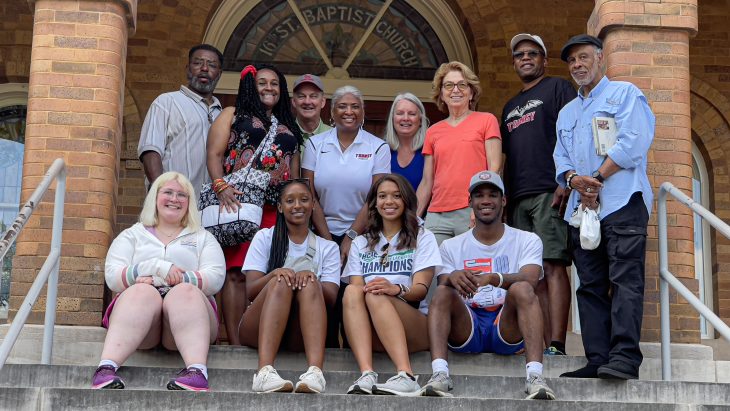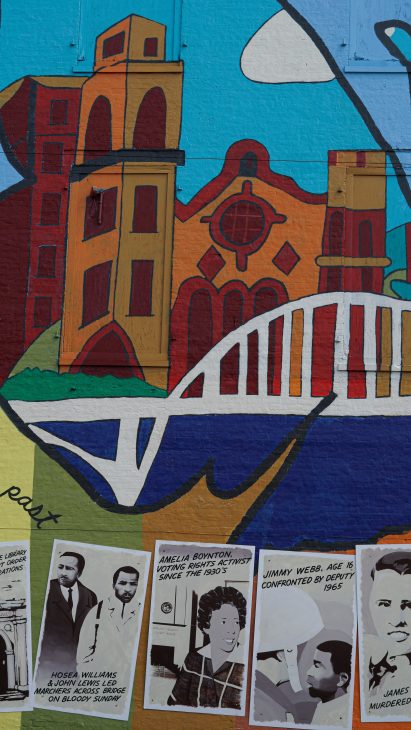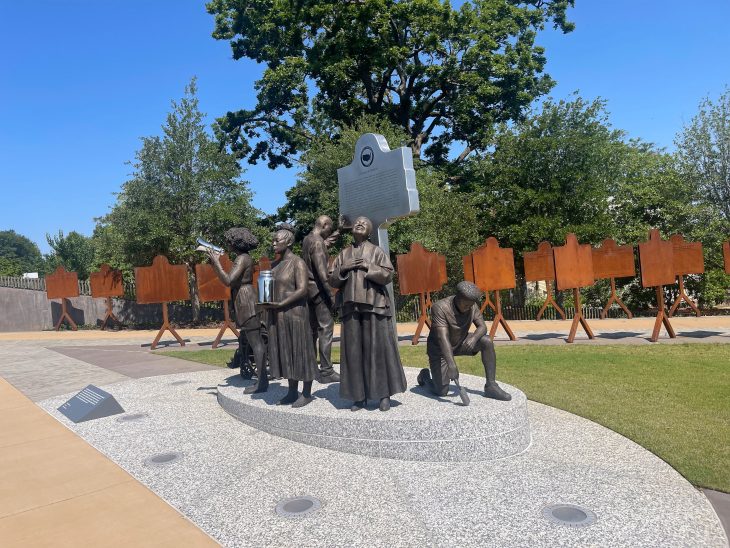
In early June, the Transylvania University Office of Diversity, Equity and Inclusion sponsored a tour of key sites in the Civil Rights Movement.
Deidra Dennie, vice president for diversity and inclusion, said she was prompted to host the tour due to recent political polarization and attacks on DEI work, believing that exposure to this often overlooked part of American history will help people “have an educated lens as you’re looking at all of this rhetoric that is out there.”
Dennie also wanted to ensure that there were viable travel opportunities available for students who wanted to study abroad but lacked the funding to do so.
“I wanted to provide an experience that was transformative, but didn’t require them to get a passport and leave the country,” she said.
Trip participants, including Transylvania students, staff members, alumni and board members, visited Selma, Birmingham and Montgomery, Alabama, via motorcoach over the course of three days. While on the road, the group toured several notable sites, including the Birmingham Civil Rights Institute, 16th Street Baptist Church, National Memorial for Peace and Justice, Freedom Rides Museum, Legacy Museum, Edmund Pettus Bridge and Lowndes Interpretive Center.
One of the student participants, Chris Bryant ’25, appreciated the opportunity to learn more about history that often goes untaught. “It hit everyone on the trip to see it in person,” he said. “It was very interactive and taught us a lot.”

Dennie said that the “dynamic and engaging” presentation at the Freedom Rides Museum was particularly educational for participants, who learned about the underlying impetus of the Freedom Rides of 1961 — which had less to do with bus boycotts than with encouraging the enforcement of federal laws already in place to desegregate interstate transportation.
“There was a clarity around what really happened with the Freedom Rides and why they were doing it,” she said. “Thousands of people were sent to Parchman Prison in Mississippi — a notoriously horrible prison that you wouldn’t send a dog to.”
While the Freedom Rides Museum was the most informative aspect of the trip for many travelers, the National Memorial for Peace and Justice was generally considered to be the most emotionally transformative experience. The site — which is the nation’s first memorial dedicated to the legacy of enslaved Black people, people terrorized by lynching, African Americans humiliated by racial segregation and Jim Crow, and people of color burdened with contemporary presumptions of guilt and police violence — features an artifact listing each state and all of the counties within that state that hosted lynchings. Every county in Kentucky was listed. “One of our students is going to return to her county and talk to the historical society there about creating a marker that can go in the city to memorialize the people that were lynched in the city center,” Dennie said.
Bryant particularly enjoyed the group’s time at the Equal Justice Initiative’s Legacy Museum, the last stop on the formal tour. “It covered history all the way from the slave trade until today,” he said. “We were only there for a couple of hours, but I could have spent the entire day there.”
As the trip concluded with lunch at Pannie-George’s, Dennie ensured that all participants had an opportunity to debrief on the bus traveling home. “Everyone lamented the huge hole in their understanding of American history,” she said. “There is a whole piece of Civil Rights history that remains untold.”
The debriefing also provided participants with an opportunity to process the emotions stirred by such raw content. “I knew it would be emotional, but I wasn’t sure how everyone would process that emotion,” Dennie said. “We had natural, organic, satisfying, moving conversations. There were many tears shed on this trip.”
Bryant noted that the tour reminded him not to take freedoms like voting for granted. “I saw where people were back then and what they worked for,” he said. “Everyone needs to know this information. There’s so much you can learn from it. I could go again and still learn new stuff.”

Dennie hopes that even more members of the Transylvania community will sign up for future tours. “This project has unlimited possibility for development and growth,” Dennie added. “I think, given this era of book-banning, censorship and revisionism, it is critical for our students’ development as enlightened, educated citizens. I would hope that Transylvania would make this project an annual offering for our community.”

